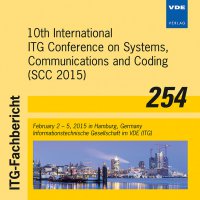Compressed Sensing Neyman-Pearson Based Activity Detection for Sparse Multiuser Communications
Konferenz: SCC 2015 - 10th International ITG Conference on Systems, Communications and Coding
02.02.2015 - 05.02.2015 in Hamburg, Germany
Tagungsband: SCC 2015
Seiten: 6Sprache: EnglischTyp: PDF
Persönliche VDE-Mitglieder erhalten auf diesen Artikel 10% Rabatt
Autoren:
Monsees, Fabian; Bockelmann, Carsten; Dekorsy, Armin (Department of Communications Engineering, University of Bremen, Germany)
Inhalt:
Compressed Sensing Multiuser Detection (CS-MUD) is a novel approach towards decreased signalling overhead in Massive Machine Type Communications (MMC). At its core CS-MUD employs techniques from Compressed Sensing and sparse signal processing to detect activity and data of nodes in MMC directly at the PHY. This approach inherently requires proper control of errors occurring at the activity detection as false alarm and missed detection errors. These two error events heavily impact the system performance and also impact the performance of higher layer error handling techniques. To simplify handling of activity errors, this paper introduces a new algorithm to keep one of these error rates constant over the whole SNR while minimizing the counterpart. This approach is commonly known as Neyman-Pearson detection and allows for detection at constant false alarm or constant missed detection rate. To employ Neyman- Pearson detection in CS-MUD we introduce a so called adaptive threshold Neyman-Pearson approach which is based on activity Log Likelihood ratios.


